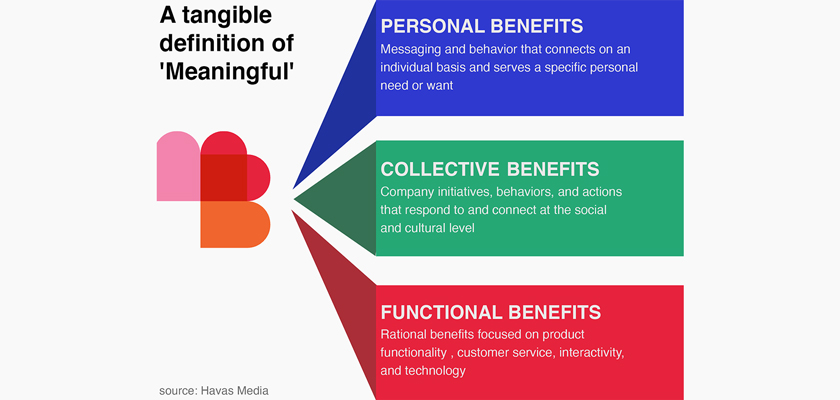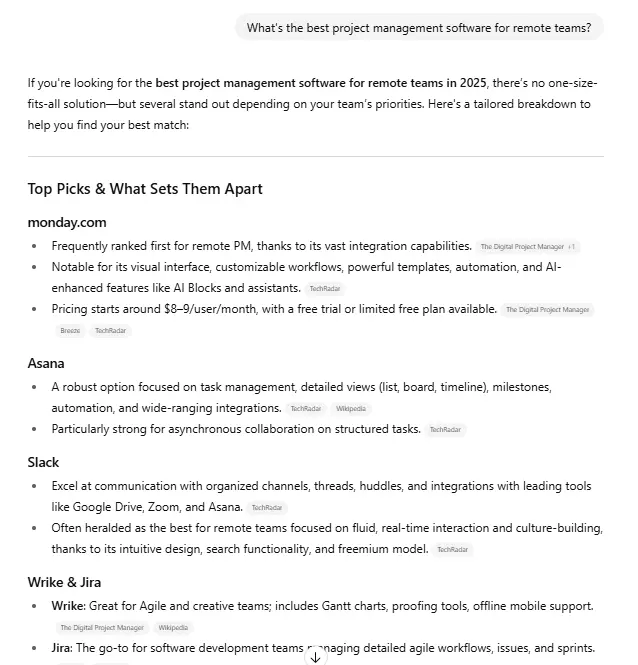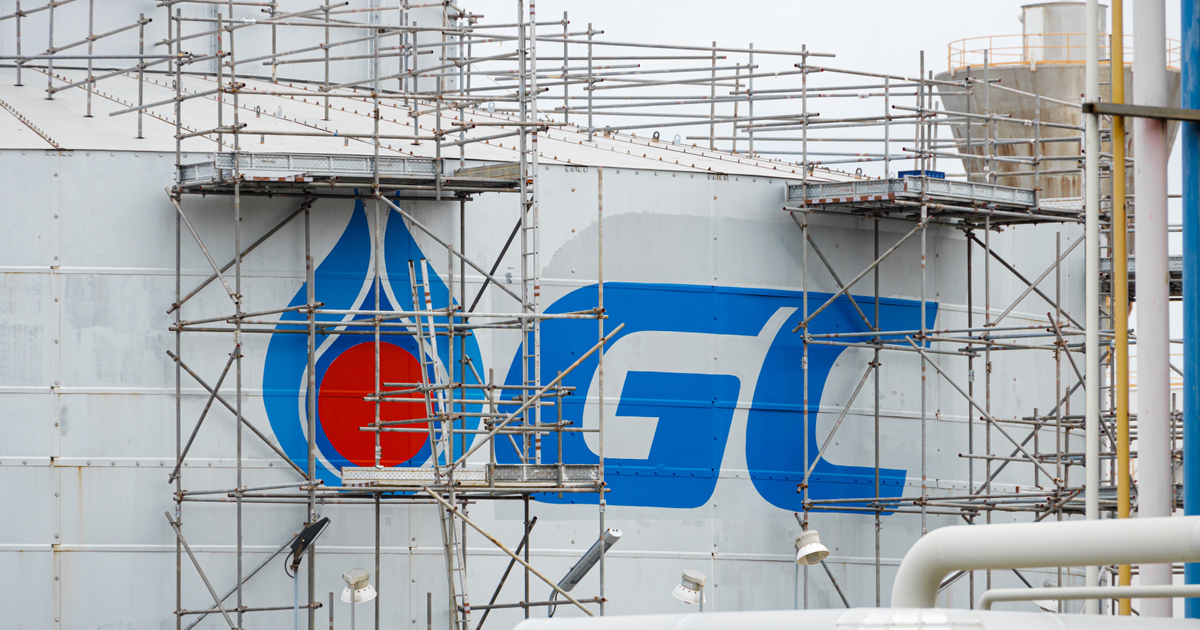How Brands With Purpose Can Impact the World?
When it comes to meaningful brand experiences, consumer demand has never been greater. In a recent study of more than 395,000 people and 2,000 brands across the globe, Havas Media provided valuable insights into the ever-shifting cultural landscape and...

When it comes to meaningful brand experiences, consumer demand has never been greater. In a recent study of more than 395,000 people and 2,000 brands across the globe, Havas Media provided valuable insights into the ever-shifting cultural landscape and its wide-ranging impact on consumer behavior.
Consumer priorities have shifted.
A global pandemic, widening political divides and a growing distrust of media and advertising platforms have led to an uptick in cynicism and often justified skepticism.
Simply put – people don’t trust what they’re being sold.
The Havas report outlines how heavily this has impacted brand loyalty, with less than half of brands considered trustworthy, and the stark reality that if 75% of brands were to disappear tomorrow, consumers would simply switch to a competitor and continue on like nothing ever happened.
Making Changes : How Brands With Purpose Can Impact the World?
So, with all of this doom and gloom, where’s the upside? What can the brands of the world do to stem this rising tide of consumer dissatisfaction?
Well, it’s time to hear and meet the needs of a more informed and marketing-aware public. One that values brands that make positive contributions that benefit individuals, society, and the environment.
Brands Can Contribute to Genuine Change
Collecting data from the world over, the Havas study sought clarity on how brands can have a positive impact on people’s lives. This could range from simple product functionality to improved personal wellbeing or, through a much wider lens, greater contributions to society as a whole.
With the data being gathered during the early months of the COVID-19 pandemic, it’s no surprise that broader cynicism evolved into a much more active distrust of brands, with 71% of people are tired of businesses not making good on their promises.
And while this trend seemed to be commonplace throughout Western markets – Australia reported over 60% of people losing trust in brands – Eastern markets did not share this same disenchantment, displaying a brand trust rate of 74% amongst study participants.
Let Your Values Take Centre Stage
So, with all this in mind, how can you both build and maintain a healthy trust amongst our markets?
There’s no doubt that today’s consumers are a switched-on bunch. They’re self-aware and more often than not, knowledgeable and passionate about many of society’s deeper issues.
The commonly used practice of corporate social washing – where businesses look to capitalize on community issues without taking any real action to make good on their claims – has been revealed for what it really is. It’s just lying.
Let’s take a look at Shell, one of the world’s largest companies, and one that operates within an industry that many believe has a lot to answer for regarding environmental impacts. Shell has stated that they are committed to “using lower-carbon energy products to reduce GHG emission”.
Yet, at the same time, their current business forecasts predict a 20% growth in fossil gas business in the coming years, with this source of energy accounting for half of its energy business by 2030.
Empty statements like these breed distrust amongst consumers.
Ultimately, the public wants to trust the brands they support. And if business owners stay true to their core messaging and values, while also putting these beliefs into action, they can enhance their credibility and avoid risking negative press and the long-lasting effects of a tarnished reputation.
While choosing a cause that aligns with your values may seem simple, deciding on just one that resonates with both your business and your customers can be quite the challenge. The great thing about this, however, is that you don’t have to limit yourself to just one cause, value, or belief.
For those of you looking to make a change, diving deeper into the Havas report and exploring the 14 dimensions outlined under its three core pillars will help you kick-start your path towards creating a more meaningful brand experience.
These three pillars are:
Personal benefitsCollective benefitsFunctional benefitsIt’s here in the report you’ll find what matters most to consumers. Currently, the driving sentiment is that people are wary of businesses that are not pulling their weight. This is represented in the 73% of participants who say brands must stop sitting on their hands and make the change today if we’re all to benefit.
And it’s not only in principle that these views are held, with 53% of consumers willing to spend more to ensure that they are supporting a company that not only meets their functional needs but also takes an actionable stance while doing it.

Strengths Lie in Personal Beliefs
The Havas study has shown that brands often prioritize functionality, safety, and value over anything else. It’s what they believe gets customers opening their wallets.
But recent changes in consumer behavior have shown that a commitment to personal benefits, such as life fulfillment and happiness, plays a much larger role in how people spend their money.
Coupling this with society’s wider collective thoughts on ethics, social justice, and transparency, it would be unwise to ignore how this affects your market’s behavior.
It appears that the pandemic has amplified these beliefs, with greater stress, isolation, and difficulties leading to stronger community ideals and people seeking more helpful, progressive, and meaningful experiences.
From the top-down, brands are now expected to only provide function and form, but help enrich their communities and make life easier.
While this isn’t going to happen overnight, these expectations are not impossible. Consumers want to feel genuinely connected to a community. And although this is not a new concept by any means, the idea of the industry being a leader in facilitating these grass-roots conversations most certainly is. As consumer responses outlined in the Havas study, this desire for increased connection is needed more than ever.
By committing to higher engagement via social media, and sponsored community events, companies have reinforced this as a critical part of not only their own future success but the success of their community.
Gen Z and Its Commitment to Identity and Expression
It might seem obvious, but supporting causes that actually align with your brand values makes it much easier to stick to your promises and course of action. In doing so, you can build stronger connections with your market, ensuring longevity and a commitment from those who support your brand.
Remember, consumers simply would not care if 75% of brands disappeared. While this is an incredible statistic, it does showcase one vital aspect of consumer behavior – they are waiting for brands that genuinely represent their personal values and who want to make a difference to the world. Reach this lofty goal, and you’ll have their support for the foreseeable future.
And while changing business practices can be a daunting task – and it may seem easier to avoid the discussion altogether – it’s important to remember that 27% of Gen Z consumers (aged 6-24) believe that breaking from the norm and displaying an active rebelliousness is essential when it comes to expressing yourself.
This is reflected in which brands they’ll keep an eye out for, with 55% of Gen Z now seeking brands that allow them to be their true selves.
Staying true to one’s identity is a core part of Gen Z’s values and belief structure. Starting from this is seen as inauthentic, so if you’d like to appeal to this powerful market, getting in touch with the causes that are close to their hearts is vital for long-term success.
Business Should Be There When It Matters Most
In a somewhat surprising finding from the Havas study, 77% of consumers expect brands to show support to people in a time of crisis.
What does that mean exactly?
This refers to companies stepping up financially, releasing a relevant update to an existing product or service, or simply posting on social media to raise awareness of a serious crisis event. Any of these actions can shine a positive light on your brand and help the people who need it most.
And while expectations for these types of responses are high, the amount of consumers who follow through on these expectations is at an almost equal amount. According to the 2020 study, 64% of respondents will buy from companies that are engaged with meaningful purposes over those who operate solely for profits.
These numbers paint a pretty clear picture of what is now expected from businesses.
No brand has exemplified this commitment to cause than Google, the company that’s currently ranked as the world’s most meaningful brand. To help assist during times of crises, they’ve even established their very own response and humanitarian aid portfolio, which has helped countless communities to prepare, respond and recover from crises.
And yes, while Google does occupy a rare economic position within the business community, the truth is, every little bit counts, and there are plenty of other businesses with healthy balance sheets which are not taking action.
This is not lost on consumers, where connecting with values such as empathy, understanding, and care for your fellow human goes a long way to establishing trust and greater goodwill between your brand and your supporters.
It’s Not Impossible
At the end of the day, creating a meaningful brand is not a walk in the park. It requires commitment and a deep understanding of how your business can impact change in society.
This is no small task. But for brands to flourish as consumers rejoin the world after years in isolation, it’s essential to invest in meaningful experiences that resonate with consumers, stakeholders, and wider society.
Let’s not forget too, that the people we’re talking about here are also your colleagues and employees, and the desire to be a part of something meaningful is both highly motivating and encourages loyalty.
Expectations have risen, and the ideals that once kept our businesses afloat are changing. Profit and direct functionality, while still important for any business to exist, have to work in tandem with consistent contributions to a more connected and self-aware world.
One where happiness, health, and sustainability are at the forefront of modern consumerism. By taking a stance, one that you’re always committed to, you’ll benefit both the world and your business.

 JimMin
JimMin 





























.jpg&h=630&w=1200&q=100&v=6e07dc5773&c=1)

